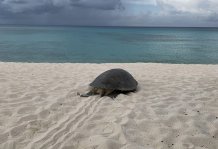
Nesting green turtle returns to sea.
Researchers are investigating how to protect sea turtles in the Cayman Islands from the multiple threats caused by climate change.
The islands' sea turtles are recovering from over-harvesting – but climate change is causing habitat loss, an increasingly female population (the sex of turtle hatchlings is determined by temperature) and has the potential to reduce egg-hatching success.
The new project – run by the Cayman Islands Department of Environment and the University of Exeter – will assess the impacts of rising temperatures, increased storminess and sea-level rise, and devise ways to protect turtles.
Using turtles as a "flagship" species, the team will also develop local capacity and outreach to improve management of coastal areas.
The project has received a grant of almost £400,000 from the UK Government's Darwin Plus scheme.
"We are delighted to be continuing our long-term collaboration with the Cayman Islands Department of Environment, with whom we have been working for over 25 years," said Professor Annette Broderick, of the Centre for Ecology and Conservation on Exeter's Penryn Campus in Cornwall. "The impacts of climate change on marine species are far reaching, and for species such as sea turtles, that come on to land to lay their eggs, protecting nesting beaches is critical for their future survival. "
The Premier of the Cayman Islands and Minister for Sustainability and Climate Resiliency, Honourable G. Wayne Panton, said: "It is a concern that turtle nesting beaches in the Cayman Islands are already being impacted by rising temperatures and increased storminess, and further sea-level rise will lead to loss of this critical habitat. We are hopeful this project will identify ways to mitigate these threats to sea turtles."
Dr Jane Hardwick, Marine Research Officer, who manages the Sea Turtle Programme for the Cayman Islands Department of Environment, said: "We are thrilled to be partnered with Exeter University on this important project. This research aims to explore how sea turtle hatchling feminisation, due to climate warming, could impact future populations and whether this can be mitigated with non-invasive techniques such as nest shading. Data will also be used to model nesting beach erosion from storms and impacts of predicted sea level rise to determine the most vulnerable nesting beaches, so that better coastal protection can be applied."
The project title is: "Mitigating the impacts of climate change on sea turtle populations."
Darwin Plus is a UK government grants scheme that funds projects that aim to protect the unique biodiversity and improve resilience to climate change within the UK Overseas Territories.






